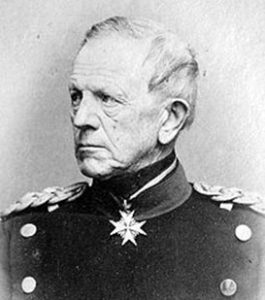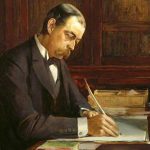Born in Prussia in 1800, Moltke lived to the astonishing age of ninety-one, almost spanning the nineteenth century. He was born to be a soldier, being Prussian, and became Chief of the General Staff at only fifty-seven. Working with his War Minister Von Roon, he was nevertheless responsible for augmenting the efficiency and size of the Prussian Army.
He fought as a field commander in the Austro-Prussian War in 1886, followed by the Franco-Prussian War in 1870/71. For these two campaigns he was made both a count (Graf or Earl) and a field marshal. Largely due to the efforts of Bismarck, Germany was united at last and Moltke became the first German Chief of Staff.
He set about the re-organisation of the army – conscription, administration, armament, munitions, food distribution, discipline and morale. He totally re-organised the General Staff, not without some grumbling from the more conservative officers. He realised that newly specialised staff officers must in the future organise the movements and supply methods of an ever growing army.
In some ways, it was others on the Staff who did the actual work, but Moltke was the guiding spirit in the quick mobilization of resources, the increasingly efficient use of the railways for the movement of troops and their supplies It was Moltke more than others, however, who recognised the modern use of massed artillery. Cavalry charges with easily broken lances, powder, cap and ball muskets and ammunition had to wiped from military manuals. Moltke studied Bonaparte’s campaigns and the theories of Clausewitz, where he found lessons to be learned and applied. He has seen how the use of the railroad in America during the Civil War had changed the face of modern warfare; he decided to mobilize the railways therefore, and use them to move his troops where they were needed most in the least time. The new breech-loading rifle, with cartridges fed into it from a magazine, gave his infantry regiments such decisive fire-power that frontal assaults of the kind that had been used for centuries would be suicidal. This he had learned from the Crimean War and the American Civil War.
But von Moltke also realised that a detailed ‘battle plan’ could only be effective until the actual start of a battle. After that anything could happen, and often did. Local commanders must be relied upon to act on their own initiative. Overall command must be de-centralized. In the 2nd World War when Hitler made himself the sole source of orders that must be obeyed on pain of death, he lost it because better strategists than he felt neglected, over-ruled and frightened. Hitler did not learn anything from Moltke.
After the eighteen-seventies his methods of conscription, strategic railways and efficient supply lines were adopted as common sense in most of Europe.










Leave A Comment